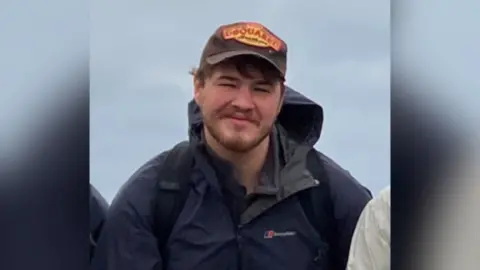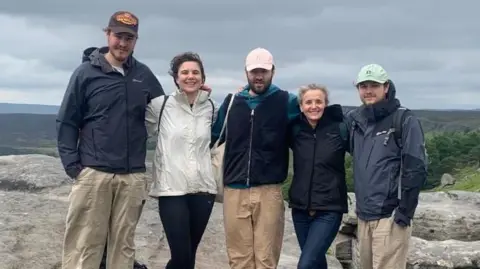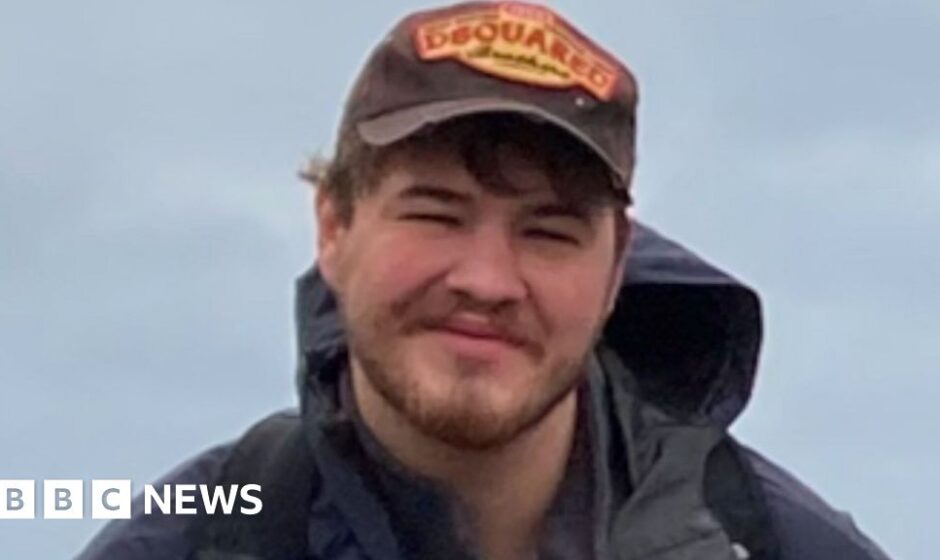Senior Social Affairs Correspondent, BBC News
 Family handout
Family handoutA 22-year-old man who died from sepsis did not receive the antibiotics and fluids “with the urgency that he should have”, a coroner has said.
William Hewes died within 24 hours of being admitted to Homerton University Hospital in east London after his meningitis, caused by a meningococcal infection, developed into sepsis in January 2023.
There were delays in giving him potentially life-saving treatment due to communication errors between staff, Mary Hassell, senior coroner for north London, said.
Delivering a narrative verdict, she criticised the hospital but added that “I simply do not know” if earlier treatment would have saved Mr Hewes.
Mr Hewes became unwell at about 13:30 GMT on 20 January and said he felt cold and had a headache.
His condition deteriorated during the afternoon and he got up after going to bed that night to tell his mother he felt very unwell and had bruising on his belly.
Suspecting meningococcal sepsis, his mother, Dr Deborah Burns, rang the hospital emergency department to warn them she and her son were on the way.
 Family Handout
Family HandoutWhile at the hospital Dr Burns – who worked as a consultant at Homerton University Hospital – said she had asked staff on eight separate occasions if they had given him antibiotics.
“I wasn’t clock-watching but I knew they were not given straight away,” she said.
“I thought the nurse was prioritising other things, medication to treat his symptoms. It wasn’t medication that was going to change the outcome of what he had.”
Giving evidence during the inquest, the medical staff who treated him said they did not recall Dr Burns asking for antibiotics eight times.
Coroner Mary Hassell said she accepted Dr Burns’ evidence on this point, although she accepted hospital staff were not being deliberately untruthful but had not heard an instruction from the registrar to administer antibiotics and fluids, as well as medication for his symptoms.
She added that Mr Hewes did not receive the antibiotics and fluids “with the urgency that he should have”.
Nevertheless, she concluded, the 22-year-old was already very unwell when he arrived at the hospital and it was not clear if would have survived had he been treated quicker.
‘I felt betrayed’
Following her son’s death, Dr Burns, a specialist in paediatrics, was told that Homerton University Hospital was going to investigate the death.
But months later she learned they had decided against an inquiry, as “there were no delays, there weren’t any concerns about his treatment”.
She told the BBC she “couldn’t understand why no investigation had been done… and also why I hadn’t been informed of the outcome”.
Dr Burns added she had been unable to return to work as she had planned, due to the way she says the hospital has treated her family since her son’s death.
“I am now much more aware of the deeply ingrained, defensive culture within the NHS. I trusted them. I felt betrayed,” she said.
“It has been totally unnecessary. If it can happen to me, then I really worry for the general population.”
 Family handout
Family handoutThe coroner said she would issue a prevention of future deaths report to Homerton University Hospital, calling on it to share the changes it had made since Mr Hewes’ death.
Solicitor Deborah Nadel, who represented Dr Burns during the inquest, said: “The coroner has made it very clear yet again how concerned she is about catastrophic errors in sepsis care.
“How many more times must a coroner flag their concerns about hospital practices around sepsis, and how many more times must a lawyer flag the terrible impact on families for things to change?”
A spokesperson for Homerton Healthcare NHS Foundation Trust said Dr Burn had “told us that our policies and processes for this situation are inadequate and detached and we are determined to learn from her experience.
“This work will ensure a more personal response for staff members or members of their family who are patients here.”
The trust added an action plan had been drawn up after Mr Hewes’ death, with changes introduced including making sure an intensive care doctor attends the bedside of a patient with suspected sepsis and delivering further training on recognising sepsis symptoms.
How to Spot Sepsis
Symptoms include:
- pale, blotchy or blue skin, lips or tongue
- a rash that does not go away when you roll a glass over it (non-blanching)
- finding it hard to breathe or breathing very fast
- feeling confused or finding it harder to talk that normal
- a weak, high-pitched cry that’s not like normal
- being sleepier than normal or difficult to wake
If you think you or someone you look after has symptoms of sepsis, call 999 or go to A&E.
Source: NHS
#Man #died #sepsis #treated #urgently



